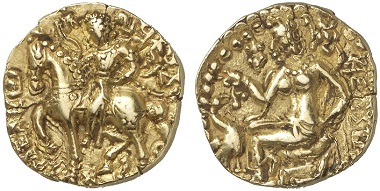by Annika Backe
January 21, 2016 – “I personally believe that melting such precious heritage is a cruel act and the government should work on making strict laws to stop it from happening “, these were the words with which Hansraj Ahir addressed the attendees of an academic conference on Gupta coinage, held in the Indian city Nagpur on January 15, 2016. The Minister of State for Chemicals and Fertilizers thus takes a clear position against the common Indian practice to melt down ancient coins because of their metal value.
Ancient coins rather formed a very important proof of ancient civilization but had been underrated by several generations, Ahir went on. He said he will hold a discussion among his government colleagues how legislation could be tightened.
Ahir most likely was met with unanimous approval from his audience which consisted of high-caliber numismatists from India and abroad who have condemned the irretrievable loss of cultural heritage for quite some time.
Former president of Numismatic Society of India, S. K. Bose, has therefore made it his duty to increase the people’s awareness towards the importance of ancient coins. He already detects first successes: “It has been because of the role of coin societies that people instead of melting coins are coming to us to know the historic value of such coins.”
Gold stater from the time of Kumaragupta (AD 414-455). From Künker Auction 226 (March 11, 2013) lot 1228.
Hansraj Ahir knows of this cultural value and, in the context of the conference, stressed the prominent position of the coinage from the Gupta Empire, mainly the gold coins minted from the time of Chandragupta I with their exquisite figural depictions. They are considered to reflect the Golden Age between ca. AD 330 and 500, characterized by peace and prosperity. The Indian Minister of State, however, regards the coins not just as a testimony of a long-gone era. In his capacity as a politician, he takes them as an incentive to continue on a way that will lead India to prosperity and stability again.
The fact that India currently witnesses a debate how laws could be used to prevent private individuals from dealing with the numismatic heritage from ancient times in an outright materialistic way is positive. Upon closer look, however, it seems a bit odd that the government is planning to legally oblige the people to protect the cultural heritage, but lays hands on century-old votives stored in temples in order to restore public finances itself.
The news about Ahir thinking of tightening legislation against the melting of ancient coins was published in the Times of India from January 16, 2016.
And please read more about the melting of the treasures kept in Indian temples in this CoinsWeekly article.





